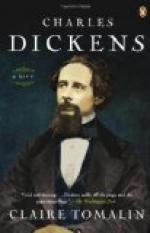But even under the old law, imprisonment for debt did not always last for ever. A legacy, and the Insolvent Debtors Act, enabled Mr. Dickens to march out of durance, in some sort with the honours of war, after a few months’ incarceration—this would be early in 1824;—and he went with his family, including Charles, to lodge with the “Mrs. Pipchin” already mentioned. Charles meanwhile still toiled on in the blacking warehouse, now removed to Chandos Street, Covent Garden; and had reached such skill in the tying, pasting, and labelling of the bottles, that small crowds used to collect at the window for the purpose of watching his deft fingers. There was pride in this, no doubt, but also humiliation; and release was at hand. His father and Lamert quarrelled about something—about what, Dickens seems never to have known—and he was sent home. Mrs. Dickens acted the part of the peacemaker on the next day, probably feeling that amid the shadowy expectations on which she and her husband had subsisted for so long, even six or seven shillings a week was something tangible, and not to be despised. Yet in spite of this, he did not return to the business. His father decided that he should go to school. “I do not write resentfully or angrily,” said Dickens, in the confidential communication made long afterwards to Forster, and to which reference has already been made; “but I never afterwards forgot, I never shall forget, I never can forget, that my mother was warm for my being sent back.”
The mothers of great men is a subject that has been handled often, and eloquently. How many of those who have achieved distinction can trace their inherited gifts to a mother’s character, and their acquired gifts to a mother’s teaching and influence. Mrs. Dickens seems not to have been a mother of this stamp. She scarcely, I fear, possessed those admirable qualities of mind and heart which one can clearly recognize as having borne fruit in the greatness and goodness of her famous son. So far as I can discover, she exercised no influence upon him at all. Her name hardly appears in his biographies. He never, that I can recollect, mentions her in his correspondence; only refers to her on the rarest occasions. And perhaps, on the whole, this is not to be wondered at, if we accept the constant tradition that she had, unknown to herself, sat to her son for the portrait of Mrs. Nickleby, and suggested to him the main traits in the character of that inconsequent and not very wise old lady. Mrs. Nickleby, I take it, was not the kind of person calculated to form the mind of a boy of genius. As well might one expect some very domestic bird to teach an eaglet how to fly.




